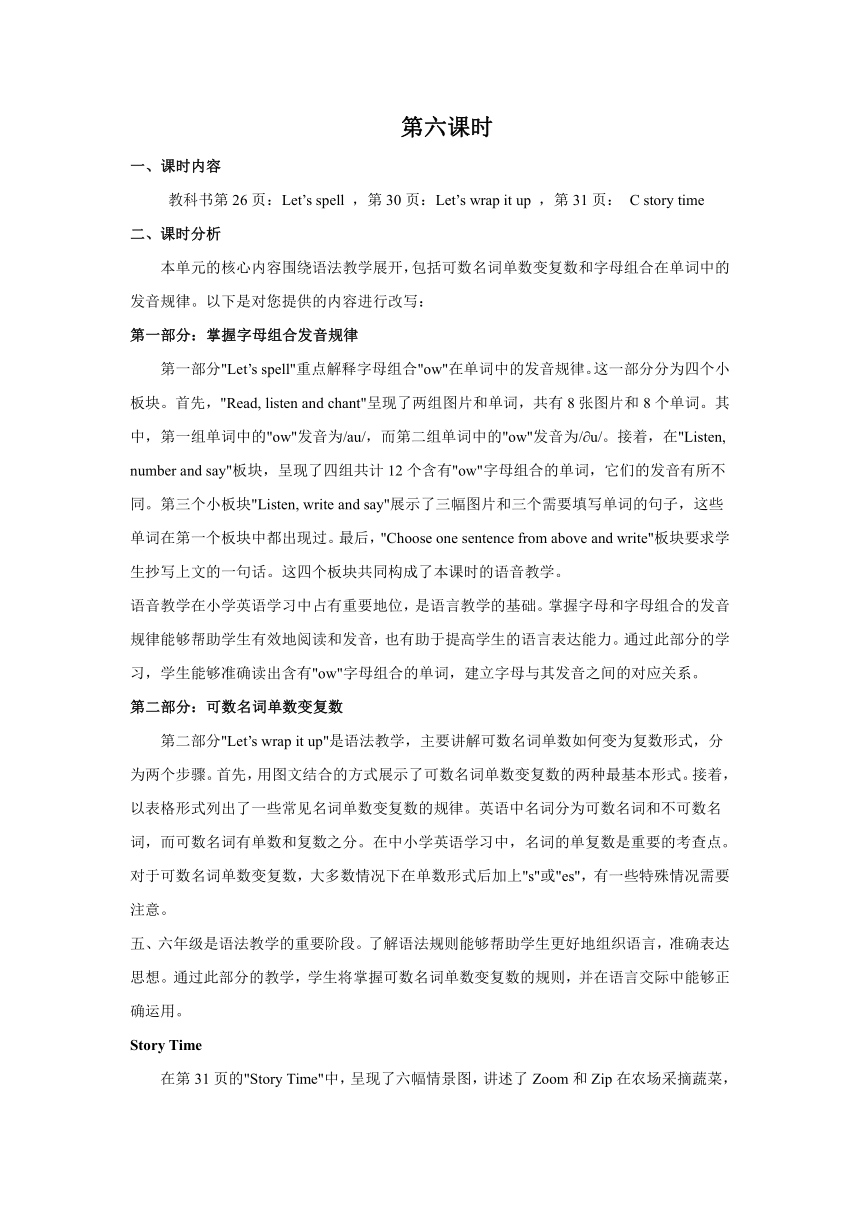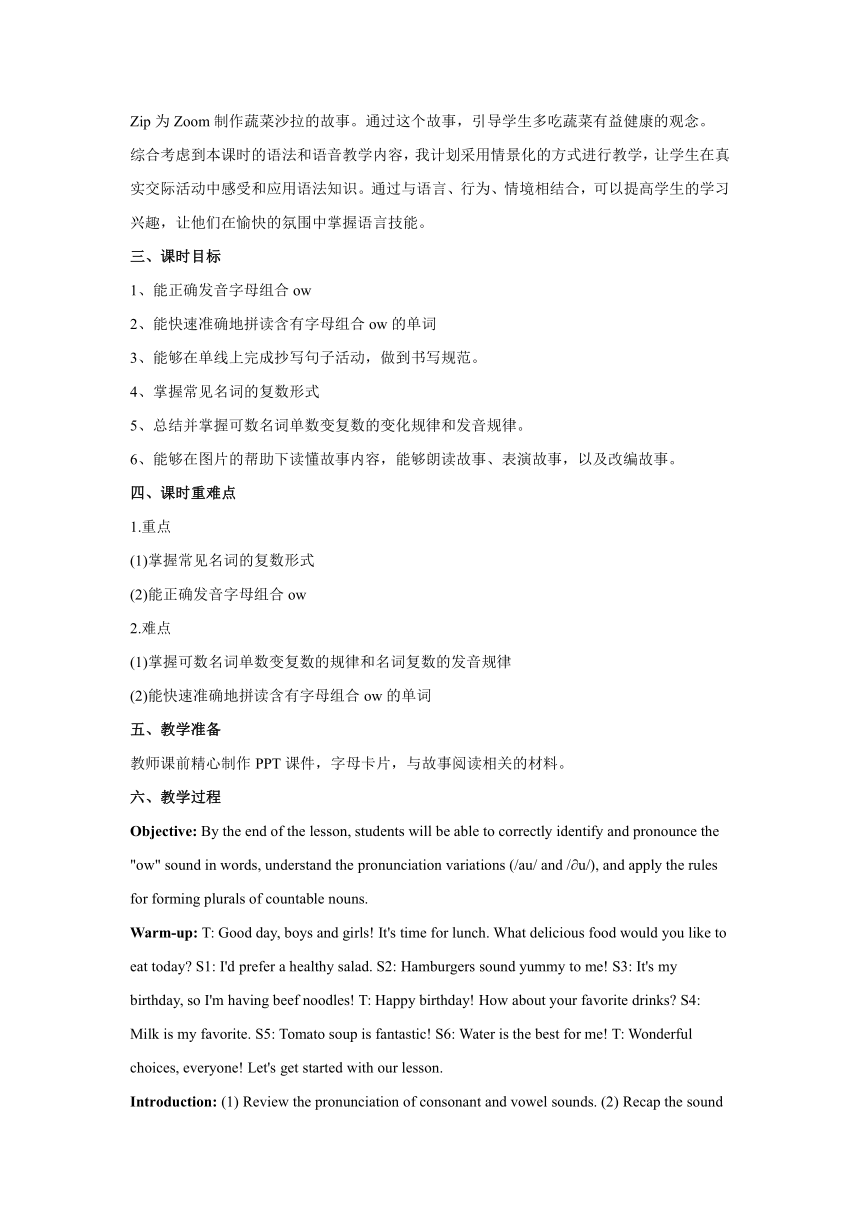Unit 3 What would you like ?教案
文档属性
| 名称 | Unit 3 What would you like ?教案 |

|
|
| 格式 | docx | ||
| 文件大小 | 29.1KB | ||
| 资源类型 | 教案 | ||
| 版本资源 | 人教版(PEP) | ||
| 科目 | 英语 | ||
| 更新时间 | 2023-08-27 00:00:00 | ||
图片预览


文档简介
第六课时
一、课时内容
教科书第26页:Let’s spell ,第30页:Let’s wrap it up ,第31页: C story time
二、课时分析
本单元的核心内容围绕语法教学展开,包括可数名词单数变复数和字母组合在单词中的发音规律。以下是对您提供的内容进行改写:
第一部分:掌握字母组合发音规律
第一部分"Let’s spell"重点解释字母组合"ow"在单词中的发音规律。这一部分分为四个小板块。首先,"Read, listen and chant"呈现了两组图片和单词,共有8张图片和8个单词。其中,第一组单词中的"ow"发音为/au/,而第二组单词中的"ow"发音为/ u/。接着,在"Listen, number and say"板块,呈现了四组共计12个含有"ow"字母组合的单词,它们的发音有所不同。第三个小板块"Listen, write and say"展示了三幅图片和三个需要填写单词的句子,这些单词在第一个板块中都出现过。最后,"Choose one sentence from above and write"板块要求学生抄写上文的一句话。这四个板块共同构成了本课时的语音教学。
语音教学在小学英语学习中占有重要地位,是语言教学的基础。掌握字母和字母组合的发音规律能够帮助学生有效地阅读和发音,也有助于提高学生的语言表达能力。通过此部分的学习,学生能够准确读出含有"ow"字母组合的单词,建立字母与其发音之间的对应关系。
第二部分:可数名词单数变复数
第二部分"Let’s wrap it up"是语法教学,主要讲解可数名词单数如何变为复数形式,分为两个步骤。首先,用图文结合的方式展示了可数名词单数变复数的两种最基本形式。接着,以表格形式列出了一些常见名词单数变复数的规律。英语中名词分为可数名词和不可数名词,而可数名词有单数和复数之分。在中小学英语学习中,名词的单复数是重要的考查点。对于可数名词单数变复数,大多数情况下在单数形式后加上"s"或"es",有一些特殊情况需要注意。
五、六年级是语法教学的重要阶段。了解语法规则能够帮助学生更好地组织语言,准确表达思想。通过此部分的教学,学生将掌握可数名词单数变复数的规则,并在语言交际中能够正确运用。
Story Time
在第31页的"Story Time"中,呈现了六幅情景图,讲述了Zoom和Zip在农场采摘蔬菜,Zip为Zoom制作蔬菜沙拉的故事。通过这个故事,引导学生多吃蔬菜有益健康的观念。
综合考虑到本课时的语法和语音教学内容,我计划采用情景化的方式进行教学,让学生在真实交际活动中感受和应用语法知识。通过与语言、行为、情境相结合,可以提高学生的学习兴趣,让他们在愉快的氛围中掌握语言技能。
三、课时目标
1、能正确发音字母组合ow
2、能快速准确地拼读含有字母组合ow的单词
3、能够在单线上完成抄写句子活动,做到书写规范。
4、掌握常见名词的复数形式
5、总结并掌握可数名词单数变复数的变化规律和发音规律。
6、能够在图片的帮助下读懂故事内容,能够朗读故事、表演故事,以及改编故事。
四、课时重难点
1.重点
(1)掌握常见名词的复数形式
(2)能正确发音字母组合ow
2.难点
(1)掌握可数名词单数变复数的规律和名词复数的发音规律
(2)能快速准确地拼读含有字母组合ow的单词
五、教学准备
教师课前精心制作PPT课件,字母卡片,与故事阅读相关的材料。
六、教学过程
Objective: By the end of the lesson, students will be able to correctly identify and pronounce the "ow" sound in words, understand the pronunciation variations (/au/ and / u/), and apply the rules for forming plurals of countable nouns.
Warm-up: T: Good day, boys and girls! It's time for lunch. What delicious food would you like to eat today S1: I'd prefer a healthy salad. S2: Hamburgers sound yummy to me! S3: It's my birthday, so I'm having beef noodles! T: Happy birthday! How about your favorite drinks S4: Milk is my favorite. S5: Tomato soup is fantastic! S6: Water is the best for me! T: Wonderful choices, everyone! Let's get started with our lesson.
Introduction: (1) Review the pronunciation of consonant and vowel sounds. (2) Recap the sound of "y" in Unit 1's "Let’s spell" section, highlighting the rule: when "y" follows a consonant, it sounds like /i/. (3) Revisit Unit 2's "Let’s spell" with the vowel combinations "ee" and "ea" and their corresponding sounds.
Presentation: Let’s spell: (1) Teach "Read, listen and chant":
Display the eight pictures and words from page 26 of the textbook. Ask students to read the words aloud.
Guide students to identify the commonality among these words: they all contain the letters "ow." (2) Present the chant with the "ow" words: It is winter. I look out of my window. I can see white snow. Down comes the snow. Slow, slow, slow.
Practice: Listen, Circle, and Say: (1) Play the listening exercise:
Play the recording for students to listen and circle the correct words: snow, how, slow, wow.
Check answers together. (2) Pronunciation practice:
Have students read the circled words chorally and individually.
Divide the class into pairs for paired reading.
Practice: Listen, Write, and Say: (1) Play the listening exercise:
Play the recording for students to complete sentences with the correct words.
Verify the answers as a class. (2) Repeat the sentences from the recording:
Play the recording again for students to listen and repeat the sentences.
Have the whole class say the sentences together. (3) Students choose a sentence they like, write it on the bottom of page 26, and read it aloud.
Practice: Let’s Wrap It Up: (1) Display singular and plural noun pairs with visuals: one apple - two apples one banana - three bananas ... Discuss the difference between the groups. (2) Introduce nouns, singular, and plural:
Clarify what nouns are and introduce the concepts of singular and plural forms.
Explain that countable nouns have both singular and plural forms.
Discuss the rule for forming plural nouns: add -s for most nouns, and -es for nouns ending in -s, -sh, -ch, -x, -o.
Highlight the irregular nouns. (3) Engage students with a plural song: Sing a simple plural song to make the grammar concept engaging.
Story Time: (1) Introduce the story:
Show a picture of a vegetable salad. T: What can you see in the picture Ss: A salad. T: Is it a fruit salad or a vegetable salad Ss: Vegetable salad. T: Let's learn how to make a delicious vegetable salad from the story.
(2) Present the story using images:
Display the story images on the board.
Prompt students to describe the images and predict the story's content.
(3) Read and understand the story:
Read the story aloud as a class, clarifying vocabulary and expressions.
Discuss the story: What did Zip and Zoom do What did they say
(4) Role-play the story:
Divide students into pairs to role-play the story using their own words.
Encourage creativity and personalization.
Conclusion: T: Well done, everyone! Today we explored the "ow" sound, learned about plural nouns, and even followed Zip's salad-making adventure. Keep up the great work and continue practicing your English skills!
Homework: (1) Copy the "Let’s spell" section from page 26 neatly. (2) Complete Exercise 21 on page 21 of the workbook. (3) Write a short paragraph (at least 50 words) about your favorite food and why you like it. (4) Draw a picture of a salad you'd make as Zip. Describe it using simple English sentences. (5) Prepare a short dialogue between a customer and a waiter discussing food and drink options.
Closure: T: That's all for today's lesson. I hope you all had fun learning with us. Remember, don't hesitate to ask questions if you're unsure about something. See you next time and have a great day!
Feel free to adapt and modify the lesson plan according to your teaching style, classroom dynamics, and the needs of your students.
板书设计
第3单元 第六课时
ow的发音:/au/, / u/
可数名词单数变复数的规律:(1) 一般情况加s (2) 以s, sh, ch, x,o结尾加es
一、课时内容
教科书第26页:Let’s spell ,第30页:Let’s wrap it up ,第31页: C story time
二、课时分析
本单元的核心内容围绕语法教学展开,包括可数名词单数变复数和字母组合在单词中的发音规律。以下是对您提供的内容进行改写:
第一部分:掌握字母组合发音规律
第一部分"Let’s spell"重点解释字母组合"ow"在单词中的发音规律。这一部分分为四个小板块。首先,"Read, listen and chant"呈现了两组图片和单词,共有8张图片和8个单词。其中,第一组单词中的"ow"发音为/au/,而第二组单词中的"ow"发音为/ u/。接着,在"Listen, number and say"板块,呈现了四组共计12个含有"ow"字母组合的单词,它们的发音有所不同。第三个小板块"Listen, write and say"展示了三幅图片和三个需要填写单词的句子,这些单词在第一个板块中都出现过。最后,"Choose one sentence from above and write"板块要求学生抄写上文的一句话。这四个板块共同构成了本课时的语音教学。
语音教学在小学英语学习中占有重要地位,是语言教学的基础。掌握字母和字母组合的发音规律能够帮助学生有效地阅读和发音,也有助于提高学生的语言表达能力。通过此部分的学习,学生能够准确读出含有"ow"字母组合的单词,建立字母与其发音之间的对应关系。
第二部分:可数名词单数变复数
第二部分"Let’s wrap it up"是语法教学,主要讲解可数名词单数如何变为复数形式,分为两个步骤。首先,用图文结合的方式展示了可数名词单数变复数的两种最基本形式。接着,以表格形式列出了一些常见名词单数变复数的规律。英语中名词分为可数名词和不可数名词,而可数名词有单数和复数之分。在中小学英语学习中,名词的单复数是重要的考查点。对于可数名词单数变复数,大多数情况下在单数形式后加上"s"或"es",有一些特殊情况需要注意。
五、六年级是语法教学的重要阶段。了解语法规则能够帮助学生更好地组织语言,准确表达思想。通过此部分的教学,学生将掌握可数名词单数变复数的规则,并在语言交际中能够正确运用。
Story Time
在第31页的"Story Time"中,呈现了六幅情景图,讲述了Zoom和Zip在农场采摘蔬菜,Zip为Zoom制作蔬菜沙拉的故事。通过这个故事,引导学生多吃蔬菜有益健康的观念。
综合考虑到本课时的语法和语音教学内容,我计划采用情景化的方式进行教学,让学生在真实交际活动中感受和应用语法知识。通过与语言、行为、情境相结合,可以提高学生的学习兴趣,让他们在愉快的氛围中掌握语言技能。
三、课时目标
1、能正确发音字母组合ow
2、能快速准确地拼读含有字母组合ow的单词
3、能够在单线上完成抄写句子活动,做到书写规范。
4、掌握常见名词的复数形式
5、总结并掌握可数名词单数变复数的变化规律和发音规律。
6、能够在图片的帮助下读懂故事内容,能够朗读故事、表演故事,以及改编故事。
四、课时重难点
1.重点
(1)掌握常见名词的复数形式
(2)能正确发音字母组合ow
2.难点
(1)掌握可数名词单数变复数的规律和名词复数的发音规律
(2)能快速准确地拼读含有字母组合ow的单词
五、教学准备
教师课前精心制作PPT课件,字母卡片,与故事阅读相关的材料。
六、教学过程
Objective: By the end of the lesson, students will be able to correctly identify and pronounce the "ow" sound in words, understand the pronunciation variations (/au/ and / u/), and apply the rules for forming plurals of countable nouns.
Warm-up: T: Good day, boys and girls! It's time for lunch. What delicious food would you like to eat today S1: I'd prefer a healthy salad. S2: Hamburgers sound yummy to me! S3: It's my birthday, so I'm having beef noodles! T: Happy birthday! How about your favorite drinks S4: Milk is my favorite. S5: Tomato soup is fantastic! S6: Water is the best for me! T: Wonderful choices, everyone! Let's get started with our lesson.
Introduction: (1) Review the pronunciation of consonant and vowel sounds. (2) Recap the sound of "y" in Unit 1's "Let’s spell" section, highlighting the rule: when "y" follows a consonant, it sounds like /i/. (3) Revisit Unit 2's "Let’s spell" with the vowel combinations "ee" and "ea" and their corresponding sounds.
Presentation: Let’s spell: (1) Teach "Read, listen and chant":
Display the eight pictures and words from page 26 of the textbook. Ask students to read the words aloud.
Guide students to identify the commonality among these words: they all contain the letters "ow." (2) Present the chant with the "ow" words: It is winter. I look out of my window. I can see white snow. Down comes the snow. Slow, slow, slow.
Practice: Listen, Circle, and Say: (1) Play the listening exercise:
Play the recording for students to listen and circle the correct words: snow, how, slow, wow.
Check answers together. (2) Pronunciation practice:
Have students read the circled words chorally and individually.
Divide the class into pairs for paired reading.
Practice: Listen, Write, and Say: (1) Play the listening exercise:
Play the recording for students to complete sentences with the correct words.
Verify the answers as a class. (2) Repeat the sentences from the recording:
Play the recording again for students to listen and repeat the sentences.
Have the whole class say the sentences together. (3) Students choose a sentence they like, write it on the bottom of page 26, and read it aloud.
Practice: Let’s Wrap It Up: (1) Display singular and plural noun pairs with visuals: one apple - two apples one banana - three bananas ... Discuss the difference between the groups. (2) Introduce nouns, singular, and plural:
Clarify what nouns are and introduce the concepts of singular and plural forms.
Explain that countable nouns have both singular and plural forms.
Discuss the rule for forming plural nouns: add -s for most nouns, and -es for nouns ending in -s, -sh, -ch, -x, -o.
Highlight the irregular nouns. (3) Engage students with a plural song: Sing a simple plural song to make the grammar concept engaging.
Story Time: (1) Introduce the story:
Show a picture of a vegetable salad. T: What can you see in the picture Ss: A salad. T: Is it a fruit salad or a vegetable salad Ss: Vegetable salad. T: Let's learn how to make a delicious vegetable salad from the story.
(2) Present the story using images:
Display the story images on the board.
Prompt students to describe the images and predict the story's content.
(3) Read and understand the story:
Read the story aloud as a class, clarifying vocabulary and expressions.
Discuss the story: What did Zip and Zoom do What did they say
(4) Role-play the story:
Divide students into pairs to role-play the story using their own words.
Encourage creativity and personalization.
Conclusion: T: Well done, everyone! Today we explored the "ow" sound, learned about plural nouns, and even followed Zip's salad-making adventure. Keep up the great work and continue practicing your English skills!
Homework: (1) Copy the "Let’s spell" section from page 26 neatly. (2) Complete Exercise 21 on page 21 of the workbook. (3) Write a short paragraph (at least 50 words) about your favorite food and why you like it. (4) Draw a picture of a salad you'd make as Zip. Describe it using simple English sentences. (5) Prepare a short dialogue between a customer and a waiter discussing food and drink options.
Closure: T: That's all for today's lesson. I hope you all had fun learning with us. Remember, don't hesitate to ask questions if you're unsure about something. See you next time and have a great day!
Feel free to adapt and modify the lesson plan according to your teaching style, classroom dynamics, and the needs of your students.
板书设计
第3单元 第六课时
ow的发音:/au/, / u/
可数名词单数变复数的规律:(1) 一般情况加s (2) 以s, sh, ch, x,o结尾加es
